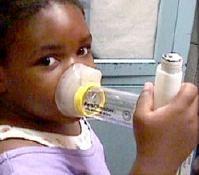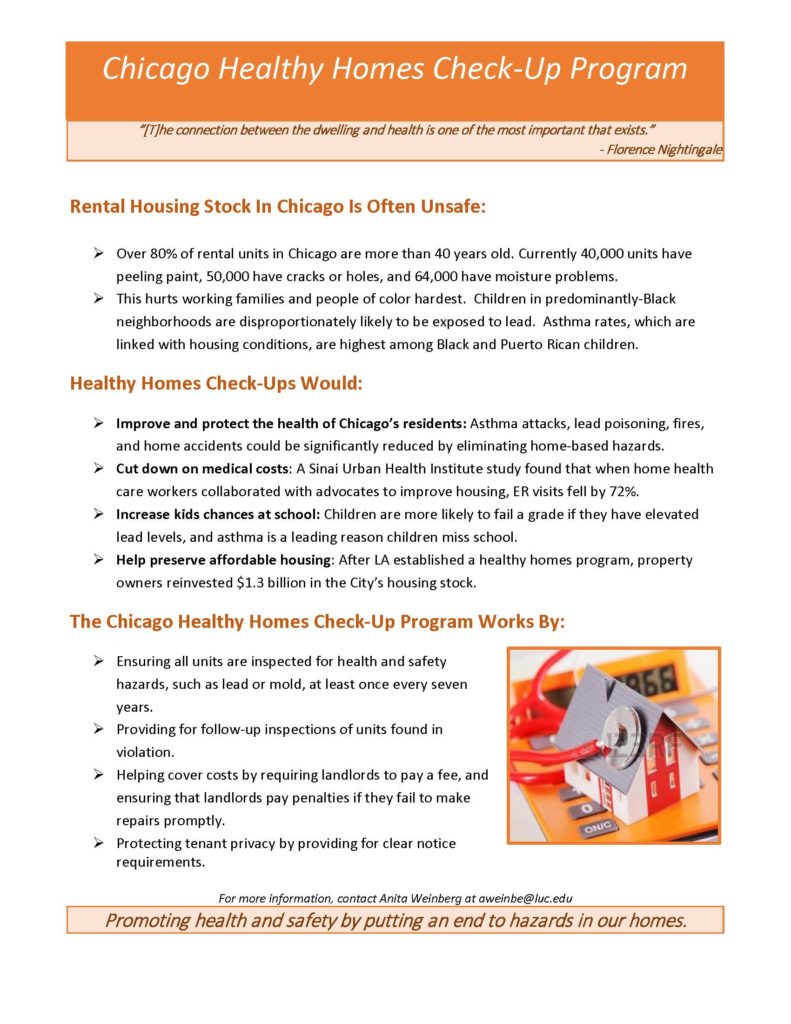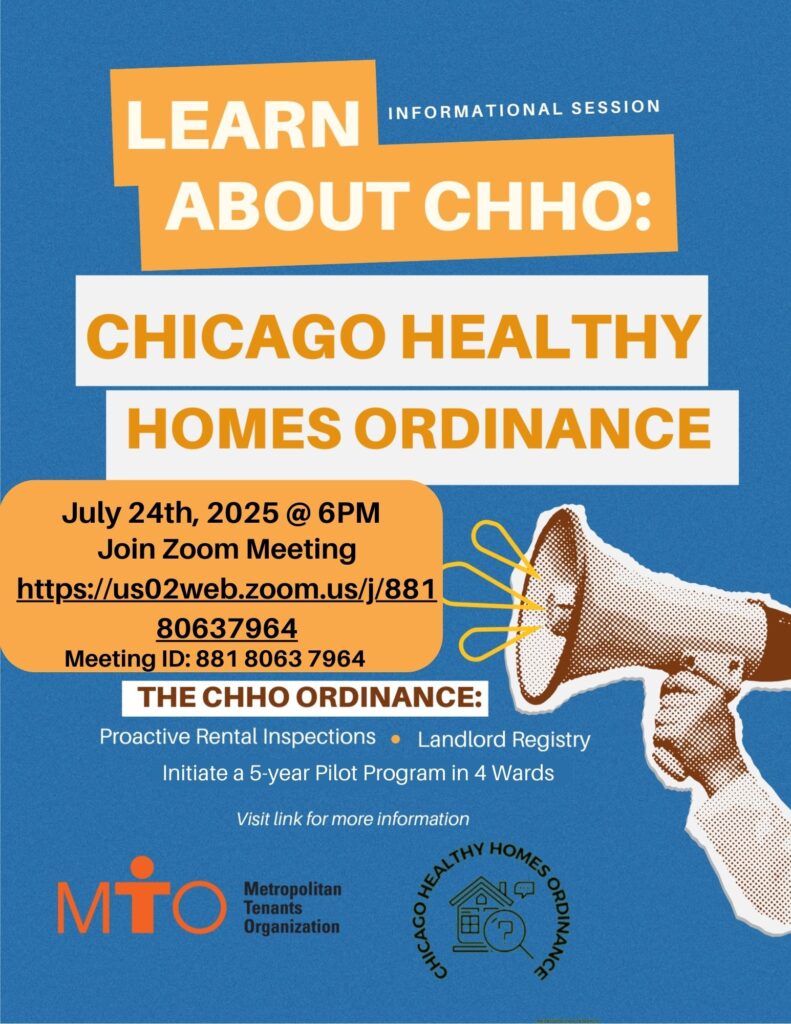
Category: Healthy Homes
Guides about health hazards in your home or apartment.
Breathing Room: MTO Helps a Family Escape Unsafe Housing

Toxic Air in Residential Apartment
Mr. Thomas came through MTO’s doors as a walk-in. He was desperate for help because his apartment was constantly filled with smoke, debris, and other fumes. Despite his repeated pleas to fix the problem, his landlord had done nothing. Mr. Thomas’s seven-year-old son suffers from bronchial asthma. His unit’s noxious air exacerbated his son’s asthma, repeatedly landing him in the hospital emergency room. Mr. Thomas tried to work out a solution and even offered to pay money to the owner to let him out of his lease, but the owner denied his requests.
MTO’s Staff Attorney intervened on his behalf.
After some back and forth, the property owner learned about the potential legal consequences. As a result, they negotiated an agreement that allowed Mr. Thomas to move and receive needed relocation assistance. Now, Mr. Thomas and his son are living in a safe, healthy apartment without the threat of eviction or collections hanging over their heads.
Advocating Using the Residential Landlord and Tenant Ordinance (RLTO)
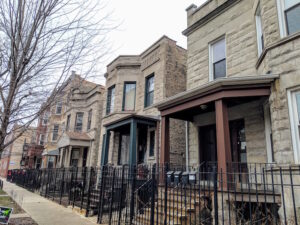
When Naeema moved into her new apartment, she was excited and thinking about the future in her new home. Within the first month, problems began appearing: the toilet would not flush, water pressure was not enough for a proper shower, and roaches scuttled across her floors.
Despite multiple attempts to get her property manager to address these problems, her concerns went unanswered, leaving her feeling stuck and frustrated. That is when Naeema reached out to MTO for help. After listening to her concerns, hotline counselors explained her rights under the Residential Landlord and Tenant Ordinance (RLTO), including her remedies for dealing with a neglectful landlord and her right to complain to Chicago’s Department of Buildings for an inspection.
With this information, Naeema felt empowered to act. Together, we helped her draft a letter to the management company detailing the issues and her rights as a tenant. The results were immediate.
Management agreed to let Naeema out of her lease without penalty and offered to refund her first month’s rent and move-in fee. Following this breakthrough, Naeema conducted a walkthrough of the apartment with the property manager. The unit was in the same condition as when she moved in, and the manager confirmed the refund and lease termination. Within that same week, Naeema picked up her refund check, covering her first month’s rent and move-in fees in full. She then moved out, leaving behind the stressful conditions and regaining peace of mind. Naeema’s persistence, combined with the right support and knowledge of her tenant rights, turned a demanding situation into a positive resolution. Now, she is ready for a fresh start in a home that meets her needs.
A Life Disrupted: Lead in the Home
 When a child is harmed by lead within the home, family life gets immediately upended. This was true for Michael and Eileen Buchanan, whose 14-month-old tested positive for elevated blood lead levels. A Chicago city inspector confirmed high lead levels throughout their unit.
When a child is harmed by lead within the home, family life gets immediately upended. This was true for Michael and Eileen Buchanan, whose 14-month-old tested positive for elevated blood lead levels. A Chicago city inspector confirmed high lead levels throughout their unit.
Right away, Mr. and Mrs. Buchanan changed their lives to protect their child’s health. The Buchanan family began to look for a safe, lead-free place to move. Since they had neither the means nor the opportunity to move immediately, they altered their apartment unit. Their once-cozy home became unrecognizable.
The Buchanans, when possible, traveled to Michigan at their own expense to stay with family and to avoid their unit. Medical bills piled up. Mr. Buchanan had to take off work to focus on taking care of his 14-month-old, putting his job at risk. Adding to the stress was the terror of not knowing how the lead would impact their child, and whether their child would experience long-term health consequences commonly associated with elevated blood lead levels. With help from MTO’s Healthy Homes Organizer, LiMei Vera, and MTO’s Staff Attorney, Philip DeVon, the Buchanans were able to successfully negotiate with their Landlord. While they secured a lease termination agreement and ample relocation assistance, they did not come out unscathed.
The Buchanans’ story is representative of a larger problem faced by tenants in Chicago: without proactive inspections, great responsibility falls on tenants to protect their children from invisible hazards in the unit. When their children are harmed by lead in the unit, they must abruptly make great adjustments in order to keep their children safe. These adjustments are costly – both in terms of time and money – and occur during a time of emotional distress and turmoil. With stories like the Buchanans’ happening throughout the city, our response is clear: we need proactive inspections of all rental units in order to protect children and their families from hazards in the home.
Asthma – FAQ
What is asthma?
Asthma is a chronic disease of the lungs that makes it very difficult to breathe. The small and medium airways swell and fill with mucus when they come into contact with certain environmental allergens. In some cases, asthma can cause death. Asthma cannot be cured but it can be controlled through medications and cleaning up your environment.
What allergens found in the home can cause asthma?
Dust mites are a common allergen that can trigger an asthma attack. Dust mites can be found in carpets, drapes, overstuffed furniture, and bedding and the result of poor air sealing of windows and doors can allow outside dust into the home.
Other common household hazards that can trigger asthma attacks are:
* Leaking plumbing and roofs; water damaged areas
* Poor ventilation in bathrooms and kitchens
* Basements and crawlspaces without proper drainage or moisture control
* Infestations of cockroaches, mice and rats can cause allergic reactions
* Extreme temperature shifts, either hot or cold, can trigger asthma attacks
Many of these conditions are violations of the building code. Learn how to enforce your right to a healthier home here.
Does the landlord have to provide heat and air-conditioning if I have asthma?
The landlord must provide heat from heat September 15 – June 1. The landlord must maintain the following minimum temperatures:
68 degrees from 8:30 am to 10:30 pm
66 degrees from 10:30 pm – 8:30 am
The landlord is not required to provide air-conditioning.
Learn more about Healthy Home Healthy Child: The Westside Children’s Asthma Partnership
Get more information about city-wide data via the Chicago Health Atlas
Lead – FAQ
Know the facts about lead:
- What is lead? Lead is a heavy metal that is harmful to your health.
- Where is lead found? The most common sources of lead are found in the home! Chipping paint and dust in homes built prior to 1978, tap water, soil and some toys and jewelry are the most common sources of lead. You can’t always see lead, even when it is present.
- What amount of lead is safe? Lead in the body is not safe at ANY level. It only takes a very small amount to cause life-long health problems, including learning disabilities, behavioral problems, and other health issues.
- What are the long-term effects of lead poisoning? Lead can damage organs, stunt neurological development and may even cause death.
- What are some of the warning signs of lead poisoning? Stomach pains, constipation, poor appetite, sleep problems, headaches, issues with sleeping.
- How do I know if I have lead in my home? If your home was built prior to 1978, there is a good chance there is lead in your home but the only way to positively identify lead is with testing. The Department of Health offers free testing if your child has recently been found with elevated levels of lead.
- Who’s responsible for addressing lead sources in the home? The landlord is responsible. Under federal law, at the start of a tenancy, the landlord must provide tenants with a lead disclosure form that details any known lead hazard in your unit or the common areas and a copy of the EPA booklet “Protect Your Family from Lead in your Home“. Under 2004 Childhood Lead Prevention Act, the landlord must also post a notice if a lead hazard has been found in another unit. That notice must remain posted until all documented hazards are properly repaired.
- What if the landlord refuses to address lead sources? Call the Renter’s Hotline at 773-292-4988 M-F, 1-5pm or call the city of Chicago’s Childhood Lead Poisoning Prevention program at 312.747.LEAD[5323]. You may request an inspection. If the landlord refuses to make repairs and old paint is pulling away from the wall, cracking, chipping or peeling and it is a code violation, you can give the landlord a 14-day written notice to reduce your rent. See “Apartment Repairs and Conditions“
- What can I do to reduce the risk of exposure?
- Ask your doctor to test your child for lead
- Regularly wet-mop floors and wet-wipe windows
- Remove shoes when entering the home
- Teach your children to wash their hands before eating
- Do not use pottery for cooking or serving without knowing if the glaze has lead
- Do not disturb paint without protecting your family from the dust
- Feed your child a diet high in iron, calcium and vitamin C – all help fight lead in the child’s body
- Test your water for lead and use a EPA approved filter
- Test soil around home and do not plant a garden before confirming that soil is safe
- Regularly check recall lists for toys, jewelry and other household items which may have lead
Still can’t find the answer? Send us your questions. Please allow several days for a response. Or to speak with a Healthy Homes Organizer, call 773.292.4980 ext. 225.
Chicago Needs Proactive Rental Inspections to Protect People’s Health
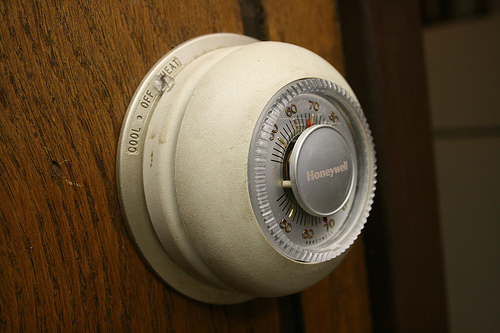
Last December, as the temperature outside plummeted, the heat in Ms. Payan’s apartment stopped working. In addition to the lack of heat, Ms. Payan also experienced flooding in her apartment. Multiple conversations with the landlord yielded no improvements. In fact, the landlord threatened Ms. Payan that she would have to pay for the repairs. Ms. Payan contacted MTO’s Healthy Homes Organizer, Angelica Ugarte, for help.
Angelica helped Ms. Payan to use Chicago’s tenants’ ordinance to terminate the lease and avoid paying rent for the last month so that Ms. Payan could have the money to relocate. The results of this story are rare. Far too many tenants experience retaliation from their landlord and face eviction when they request repairs or take the necessary steps to assert their rights under the law. Tenants are educated and empowered by MTO to understand the process and challenge abusive practices in their building. There is little accountability for slum landlords to follow building codes or ensure that apartments are in habitable condition throughout the tenancy.
The only way to hold slum landlords accountable is through regular inspections. Inspections should not wait until a crisis occurs such as the one faced by Ms. Payan. Chicago needs an inspection program that promotes regular maintenance. We encourage you to support the proactive inspection program, CHIPP (Chicago Proactive Inspection Program) which is calling for legislation to mandate routine inspection of all Chicago’s rental apartments. If you or someone you know would like to join our efforts to promote CHIPP, please call (773) 292-4980.
Chicago Needs Proactive Home Inspections!
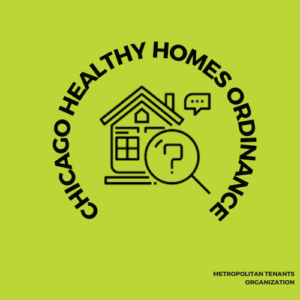
The Chicago Healthy Homes Coalition (CHHC), a coalition of renters and advocates, proposes to create a citywide rental housing registry and a proactive healthy homes inspection program. This is a matter of racial and health equity. No Chicago renter should get sick or die because health hazards, such a lead or a lack of smoke detectors, exist. No renters should have to live with mold, rats, or use their stove for heat. We call upon the city to create a citywide program to hold bad landlords accountable and to ensure that all housing is safe, decent and accessible.
Chicago does not regularly inspect housing for basic safety standards. This means that poor housing conditions can go unaddressed until a tenant makes a report to the city, often after an injury or illness. Proactive inspections will ensure that unsafe housing issues are addressed sooner, fewer people will be harmed or injured, and Chicago’s housing stock will be improved.
History + Background
A little over half of all Chicagoans are renters. The city is also home to higher-than-average rates of water leaks, heating and plumbing equipment breakdown, problems with broken plaster and peeling paint, and sewage disposal issues, according to the National Center for Healthy Housing. In 2019 renters made more than 30,000 complaints for occupied blight and other habitability issues, with most complaints coming from the South and West Side.
Simultaneously, the city does not currently require proactive inspection of rental units. Dangerous conditions are only addressed after a complaint is filed with the City. Minor issues are not addressed and unreported hazards often transition into disasters before a complaint is filed. Complaint-based inspection is additionally inadequate because inspectors often limit the the investigation only to what is reported. Many complaints are also never investigated; inspectors regularly have trouble accessing properties without landlord cooperation. The lack of a rental property registration system exacerbates this problem, as many owners do not have discoverable contact information, particularly when the property is owned by a limited liability company (LLC).
The Consequences
Lead Poisoning: Because over 81% of Chicago’s housing stock was built before the federal government banned lead-based paint in 1978, most of these buildings, many of which have not been appropriately maintained, repaired, or renovated, likely contain lead-based paint. Lead is a major neurotoxin that causes lifelong learning disabilities, hearing loss, speech delays, intellectual disability, ADHD, and aggressive/violent behaviors, even at relatively low levels. In many community areas, the childhood lead poisoning rates are more than double or quadruple the city-wide rate: from 4.4 and 5.7 per 100 children in Austin and West Garfield Park, and as high as 7.2 and 7.3 per 100 children in Englewood and West Englewood.
Asthma: Researchers have found excess moisture allows for the breeding of mold, mildew, mites, and cockroaches, and that cracks allow pests like rodents and bugs to enter the home, all of which have been linked to greater asthma morbidity and mortality. In Chicago, Black children have twice the prevalence of asthma when compared to White and Hispanic children.
Societal, Economic, and Educational Harms: Other poor housing conditions, such as presence of rats and cockroaches, missing or malfunctioning necessities (e.g., toilet, stove, windows), and other structural, electrical, and plumbing issues have been connected to higher school absenteeism, reduced performance on standardized tests, and cognitive deficiencies in students.
Fires and Fatalities: Between 2014 and 2019, 140 fires killed 92 Chicagoans. Nearly half of those fires involved buildings without a working smoke detector. A Chicago Tribune / Better Government Association investigation into fires in the same timeframe found more than two dozen cases in which safety conditions played a role in the fires, but records showed the buildings had not been inspected for five or more years.
Public Fiscal Costs: Chicago’s inability to address dangerous housing conditions is expensive to the public. Very conservatively estimating that just one-half of Chicago’s 1,376 lead-poisoned children in 2017 required special education, Chicago therefore spent roughly $7.5 million to $15 million per year in additional instructional costs for those students alone. Other studies corroborate that every dollar spent to prevent lead poisoning saves hundreds of dollars in the form of greater earnings and reduced taxpayer-funded health care, special education, and law enforcement costs.
In 2018, Chicago’s Office of Inspector General found that our current complaint-based system permitted safety and health hazards to go unaddressed for longer than the law allowed. A follow up report in 2019 gave the City recommendations to improve inspections.
Our Solution
CHHC is proposing a three-year pilot to begin the transition from Chicago’s ineffective and dangerous complaint-driven inspection system to a proven proactive rental inspection and rental registry program.
The pilot includes three major components:
(1) healthy homes inspection of all residential rental properties in two select community areas;
(2) a citywide residential rental registry
(3) community outreach to educate and engage tenants, landlords, and other stakeholders.
The program is designed to be budget neutral, as it will be funded by registration fees paid by landlords. It will be implemented by a project manager hired by the city, in collaboration with the Departments of Housing, Buildings, and Health.
Healthy Homes Inspections. The City will develop a healthy homes inspection program to be used citywide and pilot the program in two community areas—one high-need and one mixed-need. The pilot’s healthy homes inspections will incorporate nationally-recognized principles of healthy homes, including that they be dry, clean, safe, contaminant-free, well-ventilated, thermally controlled, well maintained, and accessible.
Rental Registry. As part of the pilot, the City of Chicago will establish a citywide residential rental registry, to be managed by the Department of Housing. All landlords will be required to register their rental properties with the City annually, paying a registration fee and providing some basic information about the property.
Repair Grants for Small Landlords. The rental registry fees would go into a fund that prioritizes grants for small landlords who own 6 or fewer units to make necessary repairs. This will encourage landlords to participate in the program.
Community Outreach. Because community buy-in and support is critical to the success of the pilot, the City will involve key stakeholders in the community at all stages of pilot development and implementation by creating a community advisory board to assist with oversight and evaluation at the end of the pilot. The City will also hire inspectors and other City personnel from pilot communities, which will help to ensure that the pilot is implemented equitably and with the needs of the community in mind.
9 Potential Solutions to Keep Chicagoans Safer From Fires. Better Government Association
Evaluation
To evaluate the pilot project, the City will hire an independent professional who is a healthy housing expert. This individual will design and implement a robust evaluation, collecting and analyzing both qualitative and quantitative measures.
Quantitative Measures: Identified hazards; hazards remediated; cost to the City; cost to landlords; training needs; number of inspections/inspectors; frequency of inspector success in property entry; estimated fiscal benefits for the public; financial and health benefits for impacted households.
Qualitative Measures: Qualitative measures will include open-ended interviews with inspectors, community stakeholders, advocates, landlords, and tenants about their experiences during the pilot.
The evaluation will also use the inspection data to identify common housing hazards that are not considered violations under Chicago’s Building Code and make recommendations for possible amendments. The evaluator will additionally ascertain compliance with the rental registry requirements, to inform potential incentives and penalties to ensure compliance.
**Read our full white-paper here.**
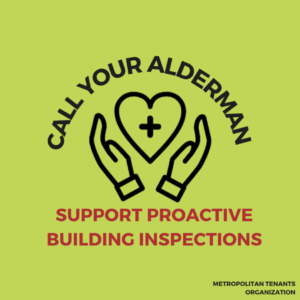
Take Action!
We need City Council to implement this project. Call your Alderman today and demand they support Chicago Healthy Homes!
Join the Coalition! Sign up to be a sponsor.
Another Eviction Prevented
Lead poisoning has been in the headlines ever since the Flint water crisis brought national attention to the problem. Chicago is grappling with its own lead poisoning crisis, which is hitting our youngest residents the hardest. Imagine if you found out your child had lead poisoning. No parent wants to receive that type of news. Now imagine that your two youngest children – twins – have elevated lead blood levels.
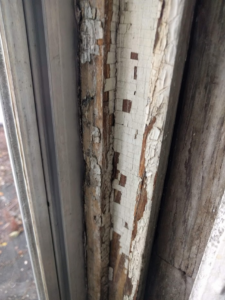
This is how we first met Ms. “W”. After a local health clinic discovered her children’s elevated lead blood levels, Ms W contacted MTO, and a Healthy Homes organizer conducted a visual inspection at her home. The deteriorating plaster walls had started to disintegrate. Half of the window frames had chipped, peeled, and cracked paint. A subsequent inspection by the Chicago Department of Public Health confirmed the assessment – there were high levels of lead in the entire unit.
Over the course of the next few weeks, MTO’s Healthy Homes Organizer provided a letter of support, collected visual documentation of the unit conditions, and shared resources for emergency housing assistance. While Ms. W. explored her options she received more devastating news, her three other children – all under the age of six – had also been poisoned. Now, her landlord was trying to evict Ms W and her family. When an unlicensed worker attempted to remediate the lead without proper safety protocols in place, MTO was able to get a city inspector to stop the illegal abatement, which was further harming her children. Ms W was partnered with a pro-bono lawyer to fight the eviction. While Ms. W. awaits to hear about a new apartment to move to she has expressed immense gratefulness for MTO’s assistance in her advocacy for safe and healthy housing.
But Ms. W wouldn’t have to experience any of this if Chicago had a proactive rental inspection program. The Chicago Healthy Homes Inspection Program (CHHIP) is a campaign lead by MTO to create just that. Hazards like lead, mold, pest infestations, and other asthma triggers can and should be caught before they become a crisis. The current building inspection system is a complaint-based service provided by city inspectors. This means that tenants hold the burden of requesting proper maintenance, property owners can neglect buildings without regular code enforcement, and families are forced to relocate or live with egregious conditions affecting their health. In today’s economy, moving is not always a viable option. We believe that the City should initiate a proactive inspection program that could identify home-based health hazards before they poison our children.
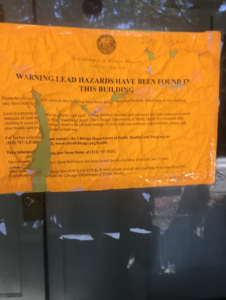
Chicago’s lead poisoning crisis is silently harming our youngest and most vulnerable residents. The Center for Disease Control (CDC) says, “no levels of lead is safe for anyone”. The CDC wants to eliminate lead poisoning in children by the year 2020. If Chicago wants to get serious about achieving this goal, we need to address the substandard housing that exists in our city and make lead prevention and remediation a priority. Our children’s lives are at stake.
MTO is excited to announce our continued partnership with the Chicago Community Trust through a 2nd year of being awarded CCT’s Housing + Health grant. Because of our supporters we are able to assist more Chicago renters and children with housing-health issues and organize for equitable solutions and policies that promote safe, healthy, and decent affordable housing for all. After all HOUSING is a HUMAN RIGHT!
If you or someone you know is in need of information about their rights as a renter or in need of assistance from our Healthy Homes Team contact MTO’s Tenants’ Rights Hotline, M-F; 1pm-5pm at 773-292-4988 or visit our offices M-Th 1pm-4:30pm.
